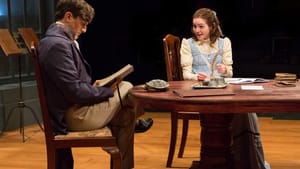Stay in the Loop
BSR publishes on a weekly schedule, with an email newsletter every Wednesday and Thursday morning. There’s no paywall, and subscribing is always free.
Romantic poetry and the second law of thermodynamics
Tom Stoppard's 'Arcadia' at Lantern Theater Company

Critics generally agreed that Arcadia is one of the best English-language plays of the past quarter-century. It is a quintessential entry in the Theater of Ideas, penned by the greatest practitioner of the genre. Who but Sir Tom Stoppard could write so amusingly about Romantic poetry, the second law of thermodynamics, and the intersections thereof?
The above makes Arcadia sound like a horribly intimidating play — or a thoroughly obnoxious one. But it isn’t. Stoppard doesn’t let the characters become puppets of his wit and intellect. The play breathes. In the right hands, Arcadia is a delightful, engaging, and engrossing escapade, and Kathryn MacMillan has the right hands.
There isn’t a false note in the Lantern Theater’s production. The set is ideal in its simplicity. MacMillan’s production benefits greatly from the tight confines of the Lantern, which puts the audience practically onstage with the performers and makes for a more intimate Arcadia. The acting is topnotch, without a single dud in the cast. It’s impressive stuff, through and through.
Arcadia takes place in Sidley Park, an English country estate that is home to the aristocratic Coverly family. The action is split between the late Napoleonic-era, 1809-1812, where math prodigy Thomasina Coverly (Alex Boyle) is being tutored in “good English algebra” and Newtonian physics by the rakish Septimus Hodge (Maxwell Eddy). The two have crackling chemistry, and it is refreshing to see the Wildean instructor believably matched and bested by his teenage student. Her mother, Lady Croom (Charlotte Northeast), seems to be having great fun swanking around and subtly seducing all eligible males who come within her sphere of influence.
Then and now
 The play splits its time between these characters and a more or less contemporary scene, set around the same long table that dominated the 19th-century room. In the present, two jousting academics — Kittson O’Neill’s reserved Hannah and Joe Guzmán’s bombastic Bernard — sort through the arcana of Sidley Park in quest of material with which to outfit their books. The contemporary iteration of the Coverly family hovers about too, the mute Gus (Trevor William Fayle), the irrepressible Chloe (Angela Smith), and Valentine (Daniel Fredrick), a snotty mathematics grad student whom Bernard dubs “Brideshead regurgitated.”
The play splits its time between these characters and a more or less contemporary scene, set around the same long table that dominated the 19th-century room. In the present, two jousting academics — Kittson O’Neill’s reserved Hannah and Joe Guzmán’s bombastic Bernard — sort through the arcana of Sidley Park in quest of material with which to outfit their books. The contemporary iteration of the Coverly family hovers about too, the mute Gus (Trevor William Fayle), the irrepressible Chloe (Angela Smith), and Valentine (Daniel Fredrick), a snotty mathematics grad student whom Bernard dubs “Brideshead regurgitated.”
The play at first seems like a riff on the classic English drawing room comedy, a bit of Noël Coward for the post-Cold War age. But it quickly slips those strictures and goes gleefully waltzing into a consideration of the heat death of the universe and the antics of Lord Byron, whose poem “Darkness” is hauntingly quoted. (And seems to be referring to that very thing: “I had a dream, which was not all a dream. / The bright sun was extinguish'd, and the stars / Did wander darkling in the eternal space.”)
The cast does a wonderful job of grounding these heady topics and making them matter. The theorizing is genuinely engrossing, and no single character is ever allowed to get the definitive upper hand. Stoppard thankfully dismisses the hoary old religion versus science debate, which a play of this sort would seem likely to fall prey to. But that would defeat his purpose.
Stoppard’s argument is clearly stated: “It's wanting to know that makes us matter.” The Lantern makes us believe it.
Above right: Guzmán and O'Neill (photo by Mark Garvin)
What, When, Where
Arcadia. By Sir Tom Stoppard. Kathryn MacMillan directed. Through November 9, 2014 at Lantern Theater Company, St. Stephen's Theater, 10th and Ludlow Streets, Philadelphia. 215-829-0395 or www.lanterntheater.org.
Sign up for our newsletter
All of the week's new articles, all in one place. Sign up for the free weekly BSR newsletters, and don't miss a conversation.
 Jake Blumgart
Jake Blumgart